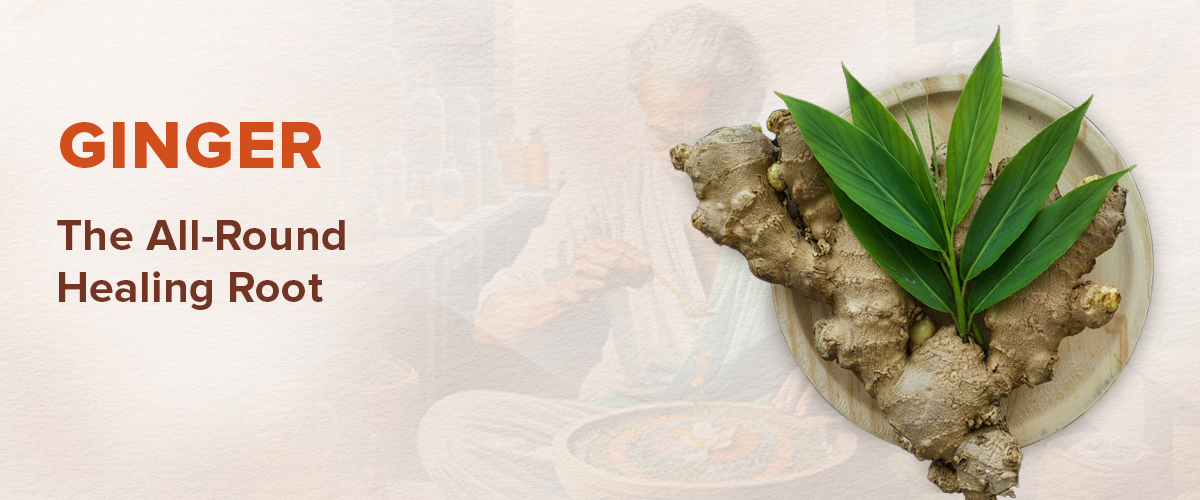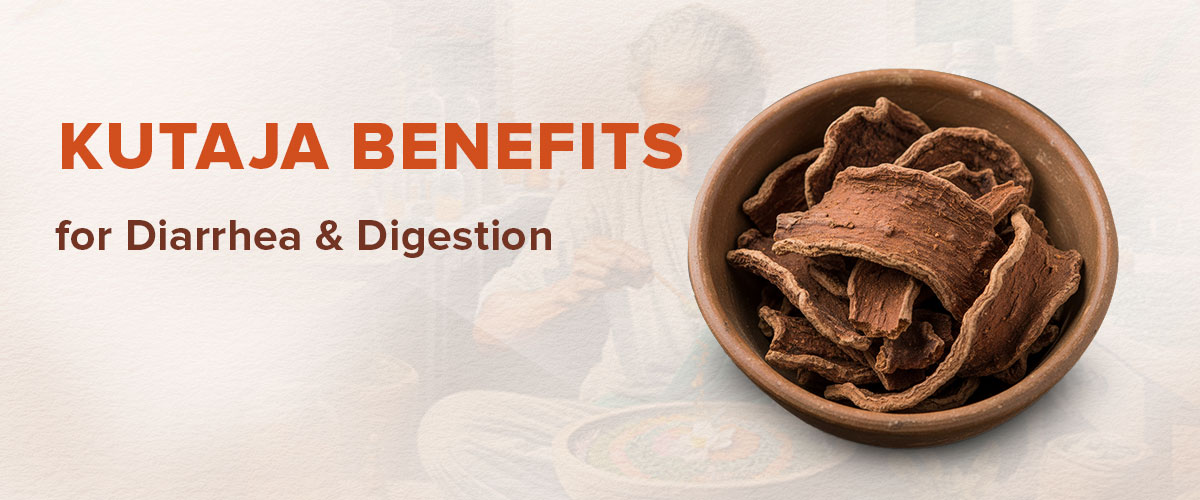Ginger: Benefits, Uses, and Healing Properties

Ginger is the root of the plant Zingiber officinale Roscoe. Ayurvedic medicine often calls it Ardraka/Shunthi. This simple root has been important in Ayurveda since ancient times. Practitioners in India and nearby areas used it more than five thousand years ago to help with digestion, nausea, and overall health.
Ginger's health benefits are still important today. Modern research keeps proving what our ancestors knew. For instance, one clinical review found that women with painful menstrual cramps (dysmenorrhea) who took ginger reported a pain level that was about 1.55 cm lower on a 10 cm scale than women who took a placebo. That means less pain and more relief on hard days.
This strong herb still lives up to its reputation from the past. In this blog, we'll talk about its healing properties, how to use it every day, and how to safely add Ginger benefits to your own routine.
What is Ginger & Its Ayurvedic Properties?
Ayurveda looks at herbs like ginger in four main ways: taste (rasa), qualities (guna), potency (virya), and the effect they have after you eat them (vipaka). Each of these tells us something about how ginger works in your body.
- Taste (Rasa): The taste of ginger is very strong and spicy. You feel warm after eating this because it is so sharp. Ayurveda says that strong flavours can help digestion and get rid of toxins (called ama).
- Qualities (Guna): Ginger is light (laghu) and a little oily (snigdha). This means that it is good for you and easy to digest. It doesn't make you feel heavy, which is why so many people use it before or after meals to help their bodies digest food better.
- Potency (Virya): Ginger's potency is heating (ushna). If you often feel cold, tired, or sluggish, this heating property can help warm you up and get your body moving again. Also, this is why ginger is good for colds, coughs, and sore joints.
- Post-Digestive Effect (Vipaka): Ginger has a sweet (madhura) effect on the body after it has been digested. This means that even though it tastes spicy, it will make you feel better, stronger, and more nourished in the end.
Ginger Benefits for Your Health
Ginger is a powerful natural healer. Whether you're drinking it in tea or adding it to your meals, Ginger benefits your health in more ways than one.
Helps with Bloating and Digestion
Ayurvedic View: According to Ayurveda, ginger can help your Agni, which is your digestive fire. Ginger can help with gas, bloating, and constipation after eating by speeding up digestion and breaking down toxins (ama).
Modern View: Research shows that ginger helps the stomach empty faster and the gut move better, which means less bloating and discomfort after meals. It also helps your body release digestive enzymes that make it easier for you to absorb nutrients.
Helps with Joint Pain and Swelling
Ayurvedic View: Ginger is good for balancing Vata. Ginger is a great daily addition because joint pain is often caused by an imbalance in Vata, especially in conditions like arthritis. It helps ease pain, swelling, and stiffness in the joints.
Modern View: Ginger has anti-inflammatory compounds like gingerol that help people with osteoarthritis and rheumatoid arthritis feel better and reduce pain and swelling.
Helps Keep Your Lungs Healthy
Ayurvedic view: Ginger is a common treatment for colds, coughs, and stuffy noses. It helps bring Kapha dosha back into balance, which can lead to mucus buildup and trouble breathing.
Modern View: Ginger helps loosen mucus, open up airways, and ease sore throats. It helps with asthma, sinusitis, and seasonal colds because it reduces inflammation and kills germs.
Helps with Menstrual Pain
Ayurvedic view: Ayurveda says that painful periods are caused by Vata being out of balance. Ginger can help ease cramps, lower back pain, and discomfort during your period by calming Vata.
Modern View: Studies have shown that ginger can help with period pain in a way that is similar to a mild painkiller. It stops the pathways that cause cramps and lowers inflammation, and it doesn't have the same side effects as modern medicines.
Aids in Weight Management
Ayurvedic view: If your metabolism is slow, ginger can help reignite your digestive fire and reduce fat tissue (meda dhatu). This makes it a natural aid in reducing weight.
Modern View: Ginger may help boost metabolism, burn fat, and control hunger. Drinking ginger water or tea before meals can help you feel fuller and manage cravings better.
Ginger for Specific Health Conditions
Ginger is good for your health in many ways, including helping you naturally deal with certain health problems.
Ginger for Nausea and Morning Sickness
Chewing on a small piece of ginger or drinking ginger tea can help settle your stomach if you feel sick while travelling or early in the morning, especially if you are pregnant. Ginger's ability to stop nausea can help you feel better without needing medicine.
Ginger for High Cholesterol
High cholesterol can clog your arteries and damage your heart. Ayurveda says that most imbalances start with Ama (toxins) and poor digestion. Ginger helps with both of these things, which is good for your heart. Recent studies also show that taking ginger on a regular basis may lower LDL (bad cholesterol) and raise HDL (good cholesterol).
Ginger for Diabetes
Ginger can be a good herb to add to your routine if you have high blood sugar. It helps your body use insulin better and keeps your blood sugar from shooting up too much. Ayurveda says this is because ginger can raise Agni and lower Kapha, both of which can help balance blood sugar naturally.
Ginger for Clear Thinking and a Good Mood
Ginger doesn't just help your body; it can also help you feel more focused and awake. Many people find that drinking warm ginger lemon water in the morning helps clear their heads and calm their nerves.
Ginger for Headache Relief
Ginger tea may help with headaches and migraines if you get them a lot. Ginger can help reduce swelling and calm the blood vessels, which can help you feel better without strong medicines.
Ginger for Motion Sickness
Do you get sick or dizzy when you travel? If you eat ginger before you go on a trip, whether it's in tea, candy, or raw slices, it can help keep you from getting sick.
Ginger for Cold Feet and Hands
Ginger's natural heating effect can help improve blood flow and warm up your body if you often feel cold in your hands and feet, especially in the winter.
Who Should Use Ginger?
Ginger is a safe and natural herb that most people can use, but it may be especially helpful for people of certain ages or with certain health needs. Here are some ways that Ginger can help people of different ages and lifestyles.
Ginger for Women
Ginger can be very helpful for women who have menstrual cramps, hormonal imbalances, or low energy. Many women feel better when they drink ginger tea during their periods to help with pain and bloating. It also increases blood flow to the reproductive organs, which may help with getting pregnant.
Ginger for Kids
Ginger can be good for kids, but only in small, age-appropriate amounts and with the right advice. A mild ginger decoction or ginger-honey mix may help your child feel better if they often get colds, coughs, or stomach problems.
Ginger for Older Adults / Seniors
If you’re a senior or care for someone older, ginger can support digestion, joint comfort, and immunity, all of which tend to weaken with age. It can also help keep blood pressure and cholesterol in check. A warm cup of ginger tea daily can go a long way in keeping energy levels up and discomfort down.
Can Ginger Be Taken with Other Medicines?
Ginger is natural, but that doesn’t always mean it’s risk-free, especially if you’re already taking other medicines. It’s always smart to be cautious when mixing herbs with modern medicines.
People taking diabetes medicines should also keep an eye on their blood sugar. Ginger can lower sugar levels, which may make your medicine work too strongly. If you’re on blood pressure medications, ginger might enhance their effect and cause your pressure to drop too low.
If you have ulcers, gallstones, or are pregnant, you should only use ginger with the advice of a Jiva certified doctor.
Is Ginger Safe? Who Should Avoid It?
When you use the right amount of ginger, it is usually safe. But like any natural treatment, it might not work for everyone. You can avoid unwanted side effects and get the most out of its benefits if you know when and how to use it.
Possible Side Effects of Ginger
Some people may have mild side effects, like:
- Gas or bloating
- Heartburn or upset stomach
- Loose motions
- Rashes on the skin or a hot feeling, especially in people with high Pitta.
To get the best results, you should always talk to a Jiva-certified Ayurvedic expert to find out the right dose and method for your body type and condition.
Ginger vs Other Ayurvedic Herbs
Ginger is one of the most powerful Ayurvedic herbs, but it’s not the only one with healing properties. Let us understand how Ginger benefits compare to other commonly used herbs in Ayurveda like Turmeric and Black Pepper.
Ginger vs Turmeric
|
Feature |
Ginger |
Turmeric |
|
Best Use |
Digestive issues, cold, nausea, joint pain |
Inflammation, skin issues, immunity |
|
Nature (Guna) |
Light, slightly oily |
Dry, light |
|
Taste (Rasa) |
Pungent |
Bitter, astringent, slightly pungent |
|
Potency (Virya) |
Heating |
Heating |
|
Effect on Mind/Body |
Energises, clears fog, reduces Vata/Kapha |
Purifies blood, supports liver, balances all three doshas (esp. Pitta) |
Ginger vs Black Pepper
|
Feature |
Ginger |
Black Pepper |
|
Best Use |
Digestion, nausea, joint pain |
Boosting metabolism, absorption of nutrients, respiratory health |
|
Nature (Guna) |
Light, slightly oily |
Dry, light |
|
Taste (Rasa) |
Pungent |
Strong pungent |
|
Potency (Virya) |
Heating |
Heating |
|
Effect on Mind/Body |
Soothing and revitalising |
Stimulating and energising |
Conclusion
Ginger is an excellent herb for your health. Ginger can help you in gentle but powerful ways if you have indigestion, low energy, period pain, or seasonal colds. And the best part is that you can easily fit it into your daily life.
But the best herbs only work well when you use them the right way. Your health needs are different from everyone else's. That's why it's always a good idea to talk to a Jiva certified expert beforehand.
Call our Jiva experts at 0129-4264323 today for personalised advice on any health issue you may be facing.
FAQs
What are medical uses for ginger?
Ginger can help with digestion problems, nausea, joint pain, coughs, colds, menstrual cramps, and even high cholesterol or blood sugar levels. It can also help with morning sickness during pregnancy (in small amounts).
How to use ginger to ease joint pain?
You can drink ginger tea two to three times a day or put warm ginger paste on the sore joint to help with the pain. It helps with swelling and stiffness. Some people also use ginger juice and sesame oil together to give a gentle massage.
What will happen if I drink ginger water every day?
Drinking ginger water every day in small amounts may help with digestion, lower inflammation, give you more energy, and help you lose weight. But if you take too much, it could make your stomach hurt or make you feel acidic. Always consult a Jiva doctor before starting any new treatment.
What organ is ginger good for?
Ginger is very good for your heart, liver, and stomach. It helps digestion, gets rid of toxins, and helps blood flow better. It also helps keep your lungs clear, especially when it's cold outside.
What are the side effects of ginger?
Taking too much ginger can give you heartburn, bloating, diarrhoea, or a burning feeling in your stomach. People who have ulcers, bleeding problems, or very sensitive stomachs should be extra careful. If you're not sure, always ask a Jiva expert.
Is it okay to eat raw ginger every day?
Yes, you can eat small amounts of raw ginger every day. A thin slice before meals can help your digestion and make you feel less bloated. If you eat too much, it could make your stomach hurt or make you feel acidic, so always eat in moderation.
Does ginger help you lose weight?
Ginger can help you lose weight by speeding up your metabolism, making it easier for your body to digest food, and lowering your cravings for sugar. Ginger tea or ginger water before meals might help you feel fuller and control your hunger better.



 Prev
Prev





























